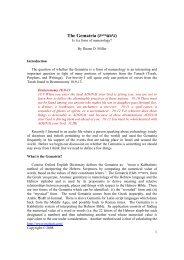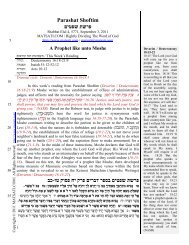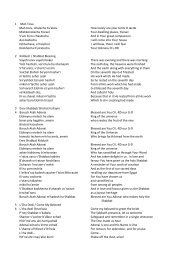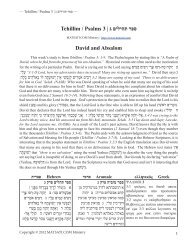Parashat Re'eh ר×× ×¤×¨×©×ª × -×× ×¤×¡×ק פרשת ר×× ×ספר ××ר×× ×¤×¨×§ ××
Parashat Re'eh ר×× ×¤×¨×©×ª × -×× ×¤×¡×ק פרשת ר×× ×ספר ××ר×× ×¤×¨×§ ××
Parashat Re'eh ר×× ×¤×¨×©×ª × -×× ×¤×¡×ק פרשת ר×× ×ספר ××ר×× ×¤×¨×§ ××
You also want an ePaper? Increase the reach of your titles
YUMPU automatically turns print PDFs into web optimized ePapers that Google loves.
עַל-הַר גְּרִ זִּים וְאֶת-הַקְּלָלָה עַל-הַר עֵיבָל: ל הֲֹלא-הֵמָּה בְּעֵבֶר הַיַּרְ דֵּן אַחֲרֵ י דֶּרֶ ְך מְבוֹא הַשֶּׁמֶשׁ<br />
בְּאֶרֶ ץ הַכְּנַעֲנִי הַיּשֵׁב בָּעֲרָ בָה מוּל הַגִּלְגָּל אֵצֶל אֵלוֹנֵי מ ֹרֶ ה :<br />
45<br />
50<br />
55<br />
60<br />
65<br />
70<br />
75<br />
80<br />
85<br />
Copyright © 2011 MATSATI.COM | All Rights Reserved: http://www.matsati.com/<br />
This week’s Parashah begins with the Hebrew word רְ אֵה which is written<br />
in the singular form meaning “see” followed by כֶם הַיּוֹם a phrase<br />
containing the plural pronoun “you.” The text indicates that each person on an<br />
individual basis אֵה) ,רְ see) will be affected by the blessing and the curse. The use<br />
of the singular/plural language is to emphasize that the Torah has been given to all<br />
“who have ears to hear” and it is the personal responsibility of each individual to<br />
choose life, to hold onto the Lord God, to obey His voice, and to walk in God’s<br />
ספר 30. word in our daily lives as Moshe says in sefer Devarim / Deuteronomy<br />
אָנ ֹכִי נ ֹתֵן לִפְנֵי<br />
יט הַעִד ֹתִי בָכֶם הַיּוֹם אֶת-הַשָּׁמַיִם וְאֶת-הָאָרֶ ץ הַחַיִּים וְהַמָּוֶת נָתַתִּי לְפָנֶיָך הַבְּרָ כָה דברים פרק ל<br />
וְהַקְּלָלָה וּבָחַרְ תָּ בַּחַיִּים לְמַעַן תִּחְיֶה אַתָּה וְזַרְ עֶָך: כ לְאַהֲבָה אֶת-יְהוָֹה אֱֹלהֶיָך לִשְׁמ ֹעַ בְּק ֹלוֹ<br />
וּלְדָבְקָה-בוֹ כִּי הוּא חַיֶּיָך וְא ֹרֶ ְך יָמֶיָך לָשֶׁבֶת עַל-הָאֲדָמָה אֲשֶׁר נִשְׁבַּע יְהוָֹה לַאֲב ֹתֶיָך לְאַבְרָ הָם<br />
לְיִצְחָק וּלְיַעֲק ֹב לָתֵת לָהֶם<br />
: Devarim / Deuteronomy 30:19 ‘I call heaven and earth to<br />
witness against you today, that I have set before you life and death, the blessing<br />
and the curse. So choose life in order that you may live, you and your<br />
descendants, 30:20 by loving the Lord your God, by obeying His voice, and by<br />
holding fast to Him; for this is your life and the length of your days, that you may<br />
live in the land which the Lord swore to your fathers, to Abraham, Isaac, and<br />
Jacob, to give them.’ (NASB) According to these scriptures, there is no room for<br />
compromise in this decision making process to “choose life.” The Scriptures say<br />
“holding fast to the Lord is your life and the length of your days” showing the<br />
absolute necessity of living each day by the holding onto and drawing near to the<br />
Lord God Almighty.<br />
The blessing and curse is contrasted with Devarim / Deuteronomy 12:8<br />
that states “you shall not do at all what we are doing here today, every man doing<br />
whatever is right in his own eyes.”<br />
פרשת ראה בספר דברים פרק יב<br />
פסוק ח- יא<br />
ח ֹלא תַעֲש ֹוּן כְּכ ֹל אֲשֶׁר אֲנַחְנוּ ע ִ ֹש ֹים פּ ֹה הַיּוֹם אִישׁ כָּל -הַיָּשָׁר בְּעֵינָיו: ט כִּי ֹלא-בָאתֶם עַד-<br />
עָתָּה אֶל-הַמְּנוּחָה וְאֶל-הַנַּחֲלָה אֲשֶׁר-יְהוָֹה אֱֹלהֶיָך נ ֹתֵן לְָך: י וַעֲבַרְ תֶּם אֶת-הַיַּרְ דֵּן וִישַׁבְתֶּם בָּאָרֶ ץ<br />
אֲשֶׁר-יְהוָֹה אֱֹלהֵיכֶם מַנְחִיל אֶתְכֶם וְהֵנִיחַ לָכֶם מִכָּל-א ֹיְבֵיכֶם מִסָּבִיב וִישַׁבְתֶּם-בֶּטַח: [שני] יא<br />
וְהָיָה הַמָּקוֹם אֲשֶׁר-יִבְחַר יְה ֹוָה אֱֹלהֵיכֶם בּוֹ לְשַׁכֵּן שְׁמוֹ שָׁם שָׁמָּה תָבִיאוּ אֵת כָּל-אֲשֶׁר אָנ ֹכִי מְצַוֶּה<br />
אֶתְכֶם עוֹֹלתֵיכֶם וְזִבְחֵיכֶם מַעְש ֹ ְר ֹתֵיכֶם וּתְרֻ מַת יֶדְכֶם וְכ ֹל מִבְחַר נִדְרֵ יכֶם אֲשֶׁר תִּדְּרוּ לַיהוָֹה<br />
:<br />
According to the Modern Hebrew lexicon, the phrase הַיָּשָׁר בְּעֵינָיו appears to be a<br />
Hebrew idiom meaning “whatsoever is right in his own eyes.” Dissecting this<br />
phrase, ישר means “straight, even, level, smooth” and the word בעיניו is from the<br />
root word עין for “eyes” along with a preposition ב (“in”) and a type two<br />
pronominal suffix (“his”) so בעיניו is translated to mean “in his eyes.” The<br />
straightness of the eye is a way of describing the path one is taking, the choice<br />
that one is making in their life to choose life or to choose death, to walk with God<br />
or to walk contrary to what God has commanded. We walk where our eyes tell us<br />
to go. What we look at for extended periods of time is the direction our mind and<br />
2<br />
Devarim / Deuteronomy<br />
12:8-11<br />
12:8 ‘You shall not do at<br />
all what we are doing here<br />
today, every man doing<br />
whatever is right in his<br />
own eyes; 12:9 for you<br />
have not as yet come to the<br />
resting place and the<br />
inheritance which the Lord<br />
your God is giving you.<br />
12:10 ‘When you cross the<br />
Jordan and live in the land<br />
which the Lord your God is<br />
giving you to inherit, and<br />
He gives you rest from all<br />
your enemies around you<br />
so that you live in security,<br />
12:11 then it shall come<br />
about that the place in<br />
which the Lord your God<br />
will choose for His name to<br />
dwell, there you shall bring<br />
all that I command you:<br />
your burnt offerings and<br />
your sacrifices, your tithes<br />
and the contribution of<br />
your hand, and all your<br />
choice votive offerings<br />
which you will vow to the<br />
Lord. (NASB)







